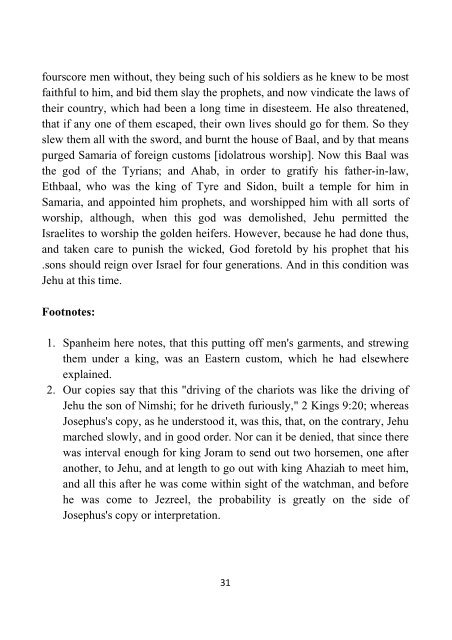You also want an ePaper? Increase the reach of your titles
YUMPU automatically turns print PDFs into web optimized ePapers that Google loves.
fourscore men without, <strong>the</strong>y being such <strong>of</strong> his soldiers as he knew <strong>to</strong> be most<br />
faithful <strong>to</strong> him, and bid <strong>the</strong>m slay <strong>the</strong> prophets, and now vindicate <strong>the</strong> laws <strong>of</strong><br />
<strong>the</strong>ir country, which had been a long time in disesteem. He also threatened,<br />
that if any one <strong>of</strong> <strong>the</strong>m escaped, <strong>the</strong>ir own lives should go for <strong>the</strong>m. So <strong>the</strong>y<br />
slew <strong>the</strong>m all with <strong>the</strong> sword, and burnt <strong>the</strong> house <strong>of</strong> Baal, and by that means<br />
purged Samaria <strong>of</strong> foreign cus<strong>to</strong>ms [idolatrous worship]. Now this Baal was<br />
<strong>the</strong> god <strong>of</strong> <strong>the</strong> Tyrians; and <strong>Ahab</strong>, in order <strong>to</strong> gratify his fa<strong>the</strong>r-in-law,<br />
Ethbaal, who was <strong>the</strong> king <strong>of</strong> Tyre and Sidon, built a temple for him in<br />
Samaria, and appointed him prophets, and worshipped him with all sorts <strong>of</strong><br />
worship, although, when this god was demolished, Jehu permitted <strong>the</strong><br />
Israelites <strong>to</strong> worship <strong>the</strong> golden heifers. However, because he had done thus,<br />
and taken care <strong>to</strong> punish <strong>the</strong> wicked, God fore<strong>to</strong>ld by his prophet that his<br />
.sons should reign over Israel for four generations. And in this condition was<br />
Jehu at this time.<br />
Footnotes:<br />
1. Spanheim here notes, that this putting <strong>of</strong>f men's garments, and strewing<br />
<strong>the</strong>m under a king, was an Eastern cus<strong>to</strong>m, which he had elsewhere<br />
explained.<br />
2. Our copies say that this "driving <strong>of</strong> <strong>the</strong> chariots was like <strong>the</strong> driving <strong>of</strong><br />
Jehu <strong>the</strong> son <strong>of</strong> Nimshi; for he driveth furiously," 2 Kings 9:20; whereas<br />
<strong>Josephus</strong>'s copy, as he unders<strong>to</strong>od it, was this, that, on <strong>the</strong> contrary, Jehu<br />
marched slowly, and in good order. Nor can it be denied, that since <strong>the</strong>re<br />
was interval enough for king Joram <strong>to</strong> send out two horsemen, one after<br />
ano<strong>the</strong>r, <strong>to</strong> Jehu, and at length <strong>to</strong> go out with king Ahaziah <strong>to</strong> meet him,<br />
and all this after he was come within sight <strong>of</strong> <strong>the</strong> watchman, and before<br />
he was come <strong>to</strong> Jezreel, <strong>the</strong> probability is greatly on <strong>the</strong> side <strong>of</strong><br />
<strong>Josephus</strong>'s copy or interpretation.<br />
31

















